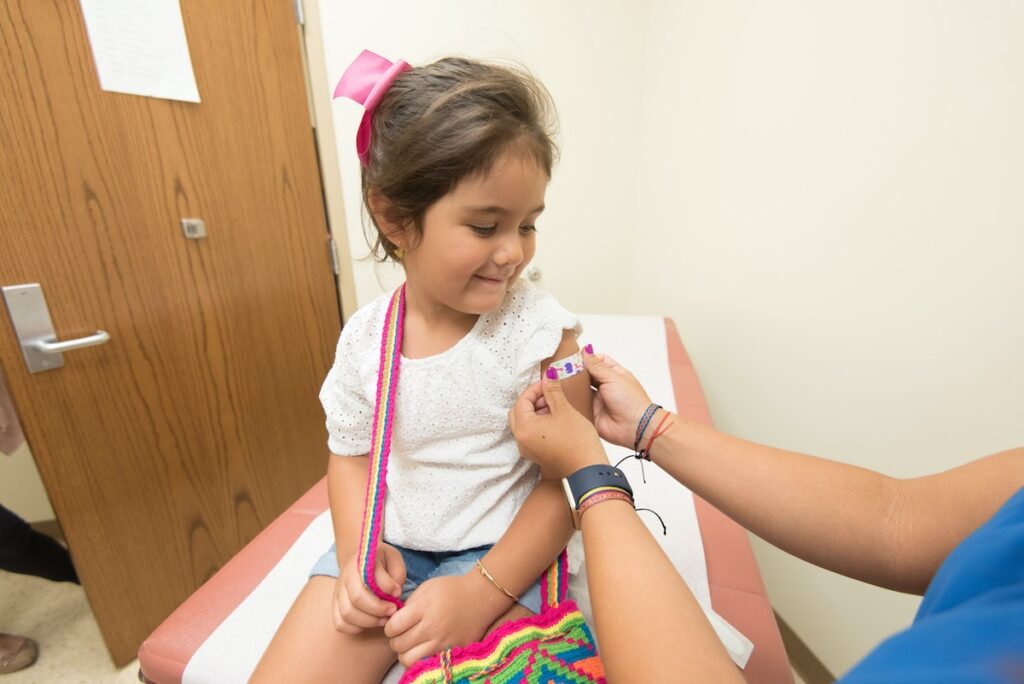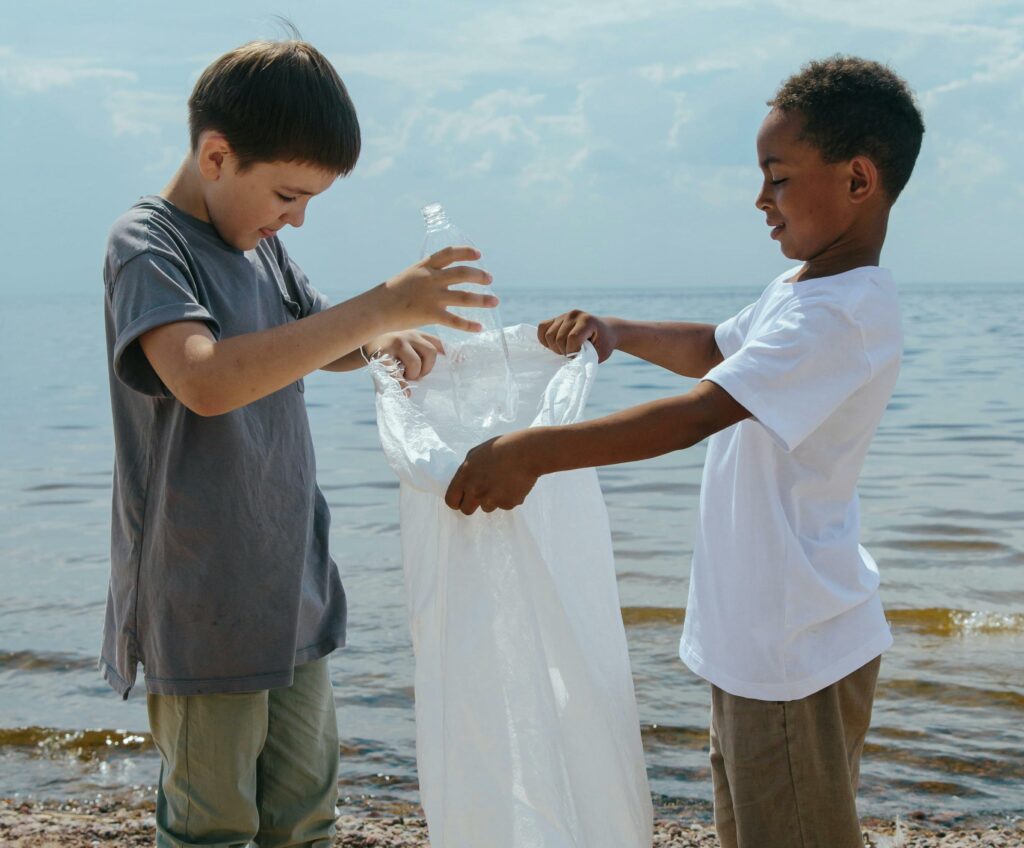As a boy reaches puberty, they will experience huge growth and changes to their bodies in a relatively small period of time.
As a parent, you can help your son through this stage. Puberty can cause them anxiety about their body’s changes or make them feel awkward or embarrassed. Here’s some steps you can take:
- Talk to them: Talk to them about the kinds of changes their bodies will experience. Explain that this is a normal process that everyone goes through.
- Share information: We have a list of books listed at the end of this post that we recommend. They can help you educate and guide your son through puberty.
- Give them privacy: Be sensitive to their need for privacy and avoid even good-natured teasing about their developmental changes.
- Teach them self care: As they experience puberty, boys may experience acne as well as sweating in the armpits and body odor. They also may have more oil and sweating on their scalp. You can help your son adjust to these changes by teaching them healthy skin care habits, teaching them to shower and shampoo more often, and providing them with antiperspirants and deodorants.
Puberty in Boys: What to expect
Testicles and Scrotum growth
For boys, the first sign of puberty is a near doubling of the size of the testicles and scrotal sac. As the testicles grow, the scrotal sac’s skin will darken, thin out, hang from the body. It will also grow tiny bumps that are hair follicles. It’s typical for boys to have one testicle hang lower than the other.
Body and facial hair
Boys will experience the growth and spread of coarse, dark hair in their pubic region. About two years after pubic hair appears, hair will grow on their face, legs, arms, and underarms.
Height and body shape
Boys will experience a huge growth spurt as they progress into puberty. This usually happens later than girls, so it’s typical to see boys at this age be a whole head shorter than girls. The body typically grows disproportionally. So, their hands and feet may grow first, which can make them look awkward or clumsy. Boys’ trunk and legs will lengthen, and they will add on muscle mass as their body continues to grow.
Penis growth
A boy’s penis will grow in length and then width, and may have adult-sized genitals as early as 13 or as late as 18. It’s typical for boys to be concerned about their penis’s size and appearance in comparison to others, such as if they were circumcised or not. They may not voice their concerns, so it can be helpful to talk to them about what’s normal development and why they were or were not circumcised.
Fertility
About a year after their testicles enlarge, boys will experience their first ejaculation. This is a sign their body is now fertile and is producing sperm and a fluid that is combined to form semen.
Wet dreams and involuntary erections
It’s normal for boys to experience an ejaculation while sleeping, often called a “wet dream.” They may wake up with wet pajamas and wonder if they wet the bed. It’s important to let your son know this is normal and nothing to be ashamed of. Boys also can experience erections unpredictably in puberty and for no apparent reason. There is not much he can do to suppress spontaneous erections, but with time, it will happen less frequently.
Voice change
Usually after the peak of their growth spurt, you may notice a change in your son’s voice. Their larynx and vocal cords enlarge, and their voice will deepen and sometimes “crack” as this change occurs.
Breast development
Boys often experience some soreness around their nipples and many often experience some breast growth. They may feel a small bump, about the size of a button, under their nipples. With time, the swelling and tenderness should disappear.
Delayed or Early Puberty
It’s normal for children to develop at different rates, starting and ending puberty years apart. However, some children experience precocious puberty, which is the early onset of puberty before age 8 in girls and before age 9 in boys. Other children may experience delayed puberty if it hasn’t begun by age 13 in girls and age 14 in boys.
If your child seems to be developing significantly different from other kids their age, contact your pediatrician at Pediatrics West at 720-284-3700. We can help determine if your child is simply developing at a different rate or if there is an underlying medical cause that may need to be treated.
Books on Puberty and Sex
To help your child understand the changes in their bodies, we’ve listed some books for your child to read that’s right for their age level.
For younger children (ages 4-8)
It’s Not the Storkby Robie H. Harris: This book is about reproduction, body differences, puberty, fetal development and body safety. This is an honest but age-appropriate look at “where babies come from.” Parents can use it as a reference for younger kids with lots of questions, read it as a family. This book is the first of a series with advancing discussion about this topic as the child grows. The additional books in this series are It’s So Amazing (ages 7 and up) and It’s Perfectly Normal (ages 10 and up).
What’s the Big Secret by Laurie Kransy Brown Ed.D., and Marc Brown (author of the Arthur series): This book is a fun and kid-friendly introduction to reproduction, body differences and body safety.
Boys (9 and up)
Guy Stuff by American Girl: This is an illustrated, age-appropriate and easy-to-read introduction to puberty for any boy. Boys can read it by themselves or with a parent. It discusses everything about taking care of a boy’s growing and changing body.
My Body, My Self for Boys by Lynda Madaras and Area Madaras: This is a workbook specifically for boys. It has a thorough discussion of puberty for boys. It pays particular attention to sex organ changes/differences, masturbation norms and taking care of a growing body. This workbook offers space for young men to reflect on changes and questions about their changing body.
Books about Sex
Let’s Talk about Sex: a Guide for Kids 9-12 and their Parents by Planned Parenthood (and Salt-N-Pepa!): This book explores not only reproduction but the many emotional challenges and behavioral obstacles that face teenagers and young adults. It has a parents guide at the end to facilitate discussion. It is an honest look at sex from all aspects—not just physical, but also emotional and psychological factors.
Changing Bodies, Changing Lives: A book for Teens on Sex and Relationships by Ruth Bell
“Love is Respect” website: www.loveisrespect.org: This website is about how to have and identify healthy relationships, dating, consent and how to avoid abusive relationships
“Sex, etc.” website: www.sxetc.org: Teens helps develop this website and is and targeted towards teens. It offers quizzes, articles with factual information written by teens, and other interactive features.
“Before Play” website: www.beforeplay.org: This website is the hub for Colorado and Michigan efforts to reduce unintended pregnancies, promote good sexual and reproductive health and well-being, and help “normalize” conversations about these topics.


